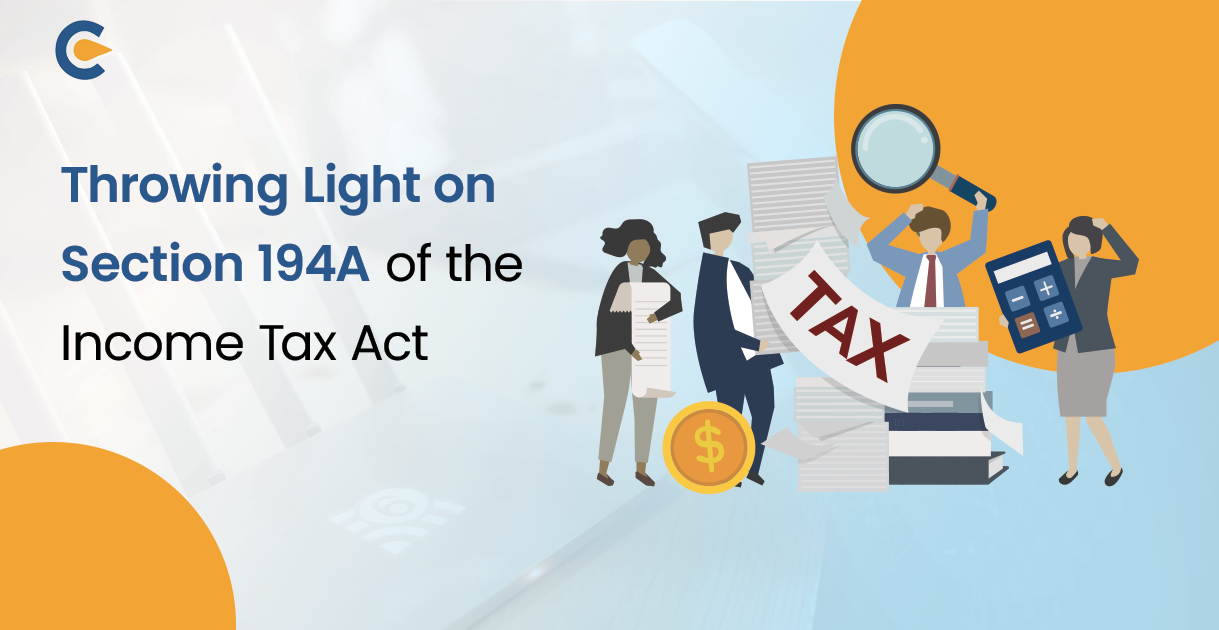If we talk about the deductibility of interest income from taxes at the source, Section 194A of the Income Tax Act of 1961 holds so much importance. This section explains that when interest payments surpass certain thresholds, individuals, Hindu Undivided Families (HUFs), and certain corporations are required to deduct tax at source. Ensuring tax compliance and preventing tax evasion in interest income transactions are the goals.
Taxpayers and financial institutions must comprehend Section 194A, which specifies the circumstances in which tax deduction is required. It also clarifies the relevant rates, exemptions, and procedural details about the deduction and remittance of tax at source on interest payments. Therefore, it serves as a key component of the tax system.
Who can Deduct Tax at Source?
The deduction of tax at source can be made as per section 194A of the Income Tax Act by the financial institutions from which the individual is receiving interest. The institutions that pay interests to individuals are included in Section 194A for tax deducted at source. These are –
- Banks
- Non-Banking Financial Companies
- Financial Institutions
- Post Offices
TDS on interest is also charged for loans, either secured or unsecured.
When is TDS Deducted and Deposited u/s 194A?
Deduction of tax at source under section 194A is done when the interest is credited to the account of the payee either directly or through cash, cheque, demand draft, or any other modes. If the annual income of the payee goes above the threshold limit set for exemption from tax liabilities, then the TDS will be deducted.
However, the deduction of tax at source under section 194A is made only if the accumulated interest received by the payee exceeds the limit of Rs 40,000. This limit is made to be Rs 50,000 in the case of senior citizens above 60 years of age. This deposit has to be made by the payee, or it can be deducted by these entities at source.
Exemption from TDS as per Section 194A of the Income Tax Act
The payee gets certain exemptions from TDS as per Section 194A of the Income Tax Act that are –
- Members are paid interests by the cooperative societies.
- Partners are being paid interest by the partnership firms.
- Interests are paid to LIC (Life Insurance Corporation of India), Financial Corporations, Unit Trust of India, banking institutions, and other insurance companies of the country.
- The interest that is paid by various institutions on some government securities.
- The interest is paid on some deposits under the government’s National Savings Scheme.
Way to Prevent the Deduction of Tax at the Source
Individuals can prevent tax deductions at the source by filling out Forms 15G and 15H for the entities eligible to make deductions at the source on the interest payment. The individual has to submit these forms to all the entities from where they are expected to receive interest. However, these forms can be filled only if the individual does not fall under the scope of tax liability and his/ her annual income is below the threshold limit set for tax deductions.
Form 15G is used by individuals under 60 who also have lower income exemptions compared to individuals above 60 who need to fill out Form 15H to claim exemption from deduction under the Income Tax Act.
Ensuring Section 194A Compliance
There is a great need to ensure that the taxpayer is complying with Section 194A of the Income Tax Act. These compliances are as follows –
- Taxpayers must understand the type of interests from entities that are subject to exemption under the section.
- They must understand the rate of interest on the interest received.
- They must obtain a PAN from the government to make sure that compliances are met.
- If the taxpayer is eligible under certain conditions for filling out Form 15G and 15H, then they must know those conditions.
- They should keep TDS track of the interest.
In a Nutshell
In summary, the Income Tax Act’s Section 194A is an essential tool for guaranteeing tax compliance and thwarting tax evasion in interest income transactions. It benefits both the government and the taxpayers by requiring the deduction of taxes at the source, which encourages accountability and openness in financial transactions. To effectively meet their tax duties, individuals, corporations, and financial institutions must have a thorough understanding of its requirements.
In addition to guaranteeing compliance with legal obligations, Section 194A compliance advances the larger objective of preserving a stable and equitable tax system. As such, this part promotes fiscal responsibility and honesty and serves as a cornerstone in the framework of income tax legislation.
Read also about Section 194A TDS On Interest To NBFCs
Frequently Asked Questions
- What are the tax rates under section 194A?
The taxpayer has to pay 10% of the tax if he/ she has the Permanent Account Number, and if he/she doesn't, then a rate of 20% as per section 194A.
- When can the taxpayer deposit TDS?
The taxpayer can deposit TDS as per section 194A before the 7th of every month from April to February, and for March, it can be deposited by the 30th of April.
- Does savings account interest come under the ambit of section 194A?
No, the savings account interest received by the taxpayers does not come under the ambit of section 194A of the Income Tax Act of 1961.
- What is the way to prevent tax deduction at the source?
Taxpayers can prevent the deduction of tax at source by filling out Forms 15G and 15H for the entities eligible to make deductions at source on interest payments. The individual must submit these forms to all the entities from which he/ she is expected to receive interest.
- Which entities are allowed for the deduction of tax at source?
The entities that are allowed for deduction of tax at source are Banks, Non-banking Financial Companies, Financial Institutions, Post Offices, and others.
- What is the limit under section 194A?
The limit under section 194A of the Income Tax Act is –
– For taxpayers under 60 years of age, the interest exemption is up to Rs 40,000.
– For Taxpayers above the age of 50 years, interest exemption is up to Rs 50,000.











